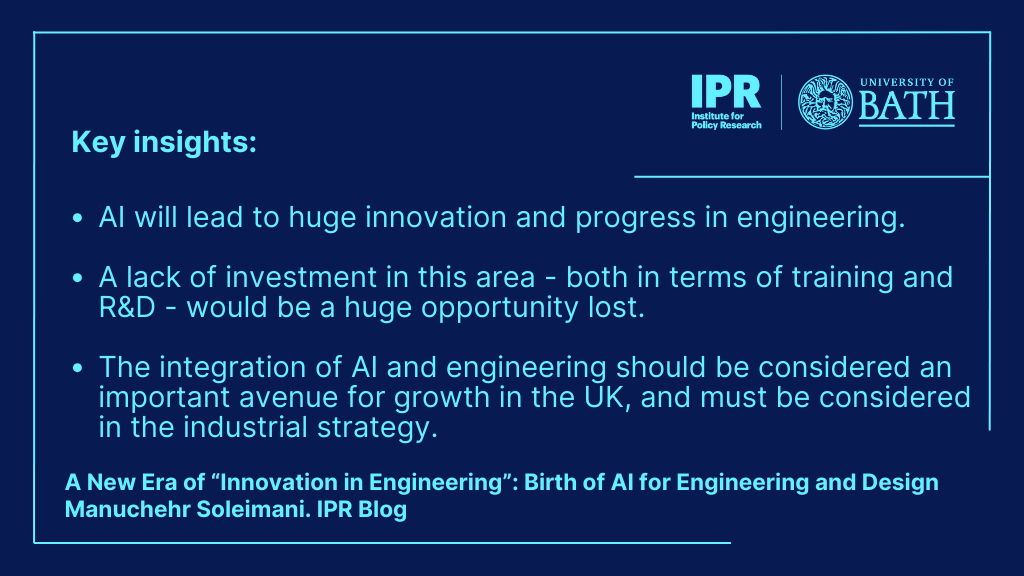From advancing cutting-edge AI systems by leveraging expertise in computer science and mathematics to exploring the political and social implications of emerging technologies, researchers at the University of Bath are at the forefront of numerous research projects that are helping to shape AI policy and understand AI’s impacts on society. Our work spans a wide range of topics, including the development of accountable, responsible, and transparent AI, applications of AI in government and the third sector, regulation and governance, ChatGPT and other large language models, generative AI, and machine learning for policy.
AI is increasingly influencing all aspects of our lives, and in this mini blog series, we aim to highlight both established and innovative AI capabilities, their applications, and their implications for society and policy. We hope you find it insightful and engaging. Other blogs in the series can be found here.
For those working in policy, operating at a senior policy level, you may also find our AI Policy Fellowship Programme of interest.
Engineers are at the forefront of innovation, creating new solutions leading to wealth creation and better quality of life for people and the planet. At the same time, they rely heavily on tools that enable them to realise these ambitions. A great example is the birth of the transistor which led to a massive engineering revolution that is still ongoing. The same can be said about the power of “deep learning”, where we are experiencing a complete change of landscape in computational engineering.
Manuch Soleimani is a mathematician and engineer by training and a Professor of Engineering at the University of Bath, working in tomographic imaging. Deep learning and AI are now a very natural and dominant tool in these areas. Along with colleagues in engineering he worked in several high-profile industrial collaborations, developing novel AI-powered sensing systems. Recently, he developed a new faculty-wide MSc program AI4ED - AI for Engineering and Design.
Based on our experience, there is strong evidence of an emerging generational impact of AI on all engineering and design disciplines. This has been a light bulb moment, where engineering innovation progresses at an unprecedented rate through the enormous power of deep learning. AI for engineering brings a unique set of tools to create a massive boost to engineering. This will lead to tangible and measurable impacts on wealth creation and productivity in the short, medium, and long term.
AI for engineering will rapidly bridge the gap between disciplines, benefiting from a unique culture in mathematics, computational science, and engineering. AI for engineering will vastly benefit from engineering culture, which is fundamentally based on regulations, ethics, and unparalleled practical rigor. In this sense, traditional engineering knowledge is as important as the AI tools themselves. All existing engineering techniques, tools, and culture will contribute to the creation of new types of AI that are explainable, reliable, and work in all conditions.
As engineers, we are obsessed with computation and predictive tools such as Al models that describe our systems. We are always challenged to create realistic models that can work in time real-time for automation and control. These new data-driven tools allow us to create these models, leading to significant change and an acceleration of engineering design as well as engineering control. Tools with a strong emphasis on cyber and data security such as Digital Twins, Cyber-physical Systems, Surrogate Modelling, Big Data, and the Internet of Things, will become the main tools in the engineering toolbox. These tools will transform the way we do manufacturing and the way we develop and maintain our infrastructure. While the ethics of AI should not be taken for granted or undermined, ethics is inherent and embedded in all aspects of engineering and design, which gives some more assurances for ethics of integrative AI for engineering. .
AI for engineering is an area of enormous importance and can act as an easy win in terms of the impact of AI on society. Not investing in this area – both in terms of training AI Engineers and investing in R&D – would be a huge opportunity lost. I anticipate this will be a new battleground between stakeholders as well as between nations.
Below are some ideas of how AI for engineering may affect different stakeholders and how they should respond:
Academia: The decision-makers in universities and research institutes must enable the complete realisation of AI for engineering, recognising this as a field that can bring many disciplines together. Universities should help to embed AI in their research, education, and knowledge-exchange missions. This can include upskilling their students, technical staff, and academic staff in this field.
Government: In Britain (and many other countries) there is a need to rethink our industrial strategy. The combined and bi-directional integration of AI and engineering should be considered an important way for technological innovation, leading to growth by unlocking great potential in many sectors that are not currently productive. The establishment of specific programs to create and recognise multidisciplinary AI for engineering research and education is timely and urgent. If not done properly, the UK cannot effectively benefit from the AI revolution and may become an analogue society in the digital age.
Industry: In recent years, many large companies have invested heavily in AI and in digital transformation plans. A hybrid AI4ED skillset is of great interest to these large organisations. On the other hand, small to medium-sized industries could also massively benefit from the AI revolution, especially the application of AI in their domain. Small and medium-sized enterprises (SMEs) often have a great knowledge of their field, if this is matched with support in AI tools, they could generate new intellectual property and products and therefore contribute to sustainability and growth for these businesses. Often the SMEs don’t have the resources to see the tools implemented in their products and solutions. This can be of great potential for balanced wealth generation and enormous productivity gains unlocking massive opportunities. The universities can play a key role in knowledge transfer in this area – empowering their local and regional innovation ecosystems and aiding SMEs on their journey.
All articles posted on this blog give the views of the author(s), and not the position of the IPR, nor of the University of Bath.
Respond





